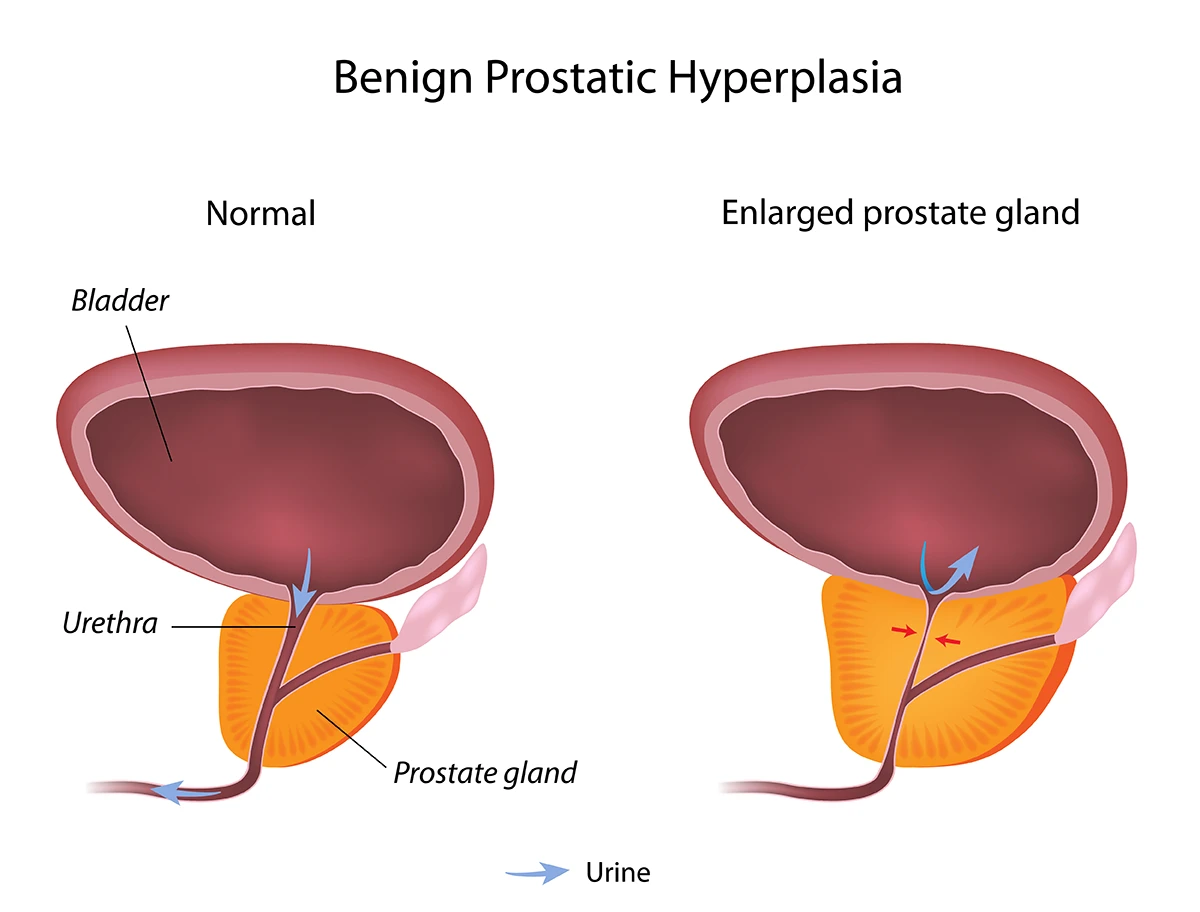Enlarged prostate (benign prostatic hyperplasia - BPH)
Find a urologist
Benign prostatic hyperplasia (BPH) is the enlargement of the prostate gland in men, as seen on the right.
Benign prostatic hyperplasia (BPH), commonly called an enlarged prostate, is the noncancerous enlargement of the prostate gland. It is the most common benign tumor found in men or those assigned male at birth.
BPH causes the prostate gland, which is located just underneath the bladder and surrounds the urethra, to grow or become enlarged.
The prostate is normally about the size of a walnut. It helps control urine flow and produces a fluid that protects sperm known as semen. It is common for your prostate to grow as you age.
While BPH isn’t cancerous, its symptoms could indicate prostate cancer or other serious conditions.
BPH causes and risk factors
As you age, your prostate often grows, creating what doctors call enlarged prostate or benign prostatic hyperplasia (BPH). BPH affects one in four men by the age of 55.
It is not known what causes an enlarged prostate. However, research suggests that factors such as age, changes in testicular cells and low testosterone levels may increase the risk of BPH.
Other research suggests that BPH doesn’t increase the risk of developing prostate cancer, but benign prostatic hyperplasia and prostate cancer have similar symptoms. It is recommended that men have annual prostate screenings every year beginning at age 55 or sooner if you have an increased risk, including a family history.
Enlarged prostate symptoms
Since your prostate surrounds your urethra, one of the first signs of an enlarged prostate gland is difficulty peeing. Common BPH symptoms may include:
- Being unable to empty your bladder completely
- Dribbling at the end of urination
- Feeling the need to urinate frequently or urgently
- Getting up at night to go pee
- Stopping and starting while urinating
- Pain after ejaculating or while urinating
- While urinating, you smell a strong odor in your urine
- Coloring of your pee changes
- Leaking (incontinence)
If you notice blood in your urine or semen or if you experience erectile dysfunction, schedule an appointment with your urologist right away as these could be signs of prostate cancer.
BPH diagnosis and testing
Talk to your urologist about your BPH symptoms, even if they aren’t bothering you. Without proper treatment, benign prostatic hyperplasia could cause damage to your kidneys or more blocking of the urethra. It could also cause a urinary tract infection (UTI), bladder stones or blood in your urine.
Your doctor will perform a physical exam and review your medical history. They may perform a rectal exam to check the prostate for lumps or hard areas and determine if it is enlarged. Other tests your urologist may recommend include an ultrasound, urine test or a cystoscopy to look at your bladder.
Treatment for BPH
Your doctor may not suggest treatment if your symptoms are not bothersome. Instead, they may recommend regular checkups to monitor your enlarged prostate.
If you do need treatment, your doctor may prescribe medications to relax the muscles of your prostate to reduce tension on the urethra. Surgery to remove the prostate may be recommended if your enlarged prostate is severely blocking the urethra.
Minimally invasive BPH treatments may also be available, including the insertion of a prostatic urethral lift or water vapor therapy. Both of these procedures are outpatient, and you should be able to return to normal activities in a few days.
Living with an enlarged prostate
Changing your diet may help relieve some symptoms. Eating citrus fruits, leafy green vegetables, tomatoes and turmeric may be beneficial for prostate health management. It’s also a good idea to avoid alcohol, caffeine, red meat and salt.
If your symptoms are painful or you have blood in your urine, see your urologist right away.
Get care
We help you live well. And we’re here for you in person and online.